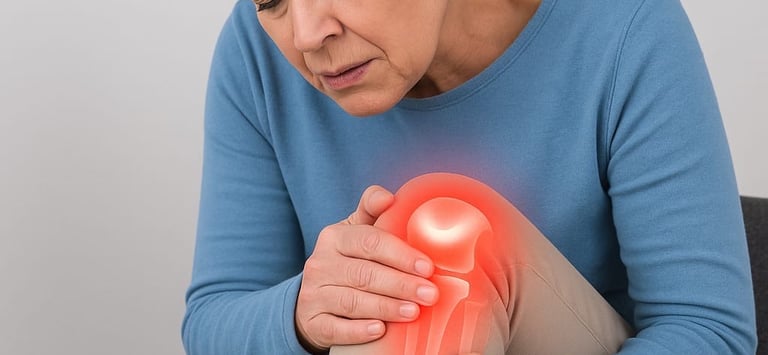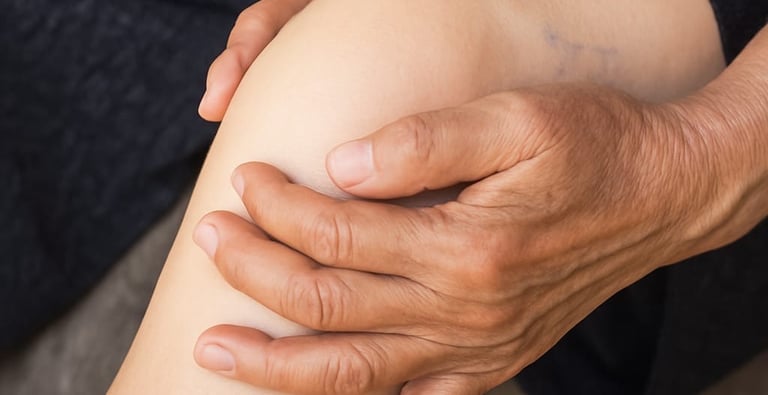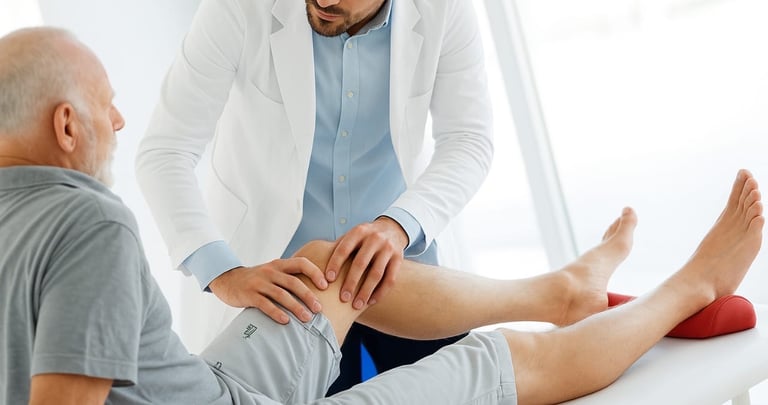What is Osteoarthritis?
Osteoarthritis (OA) is the most common form of arthritis, often called the “wear and tear” arthritis. It occurs when the protective cartilage that cushions the ends of the bones gradually wears down, leading to pain, stiffness, and reduced joint mobility.
OA can affect any joint but is most common in the knees, hips, spine, and hands. Though it is associated with aging, it can also occur due to overuse, injuries, or genetic factors.
Our Approach at Myo Physio at Home
At Myo Physio at Home, we treat osteoarthritis with a non-surgical, movement-based, and pain-relieving approach—all delivered in the comfort of your home. Our goal is to:
Reduce pain and inflammation
Improve joint mobility
Strengthen surrounding muscles
Enhance daily function
Prevent further joint degeneration
We combine Physiotherapy, Manual Therapy, and Chiropractic Care with lifestyle coaching to provide a customized care plan for each patient.
Common Causes of Osteoarthritis
1. Age-related cartilage breakdown
Natural wear and tear due to aging is the most common cause.
2. Joint overuse or repetitive strain
Common in athletes or workers who perform repeated motions.
3. Previous joint injury
Fractures, ligament injuries, or surgeries can accelerate OA.
4. Obesity
Extra weight adds pressure to weight-bearing joints like knees and hips.
5. Poor joint alignment
Improper posture or biomechanics can unevenly wear down joints.
6. Muscle weakness
Weak muscles fail to support and stabilize joints properly.
7. Genetics
Family history can increase the risk of developing OA.
Symptoms of Osteoarthritis
Joint pain and stiffness, especially after activity or rest
Swelling or tenderness around the joint
Reduced range of motion
Grinding or crackling sounds during joint movement (crepitus)
Joint deformity or enlargement (in advanced stages)
Difficulty with daily tasks such as climbing stairs, walking, or gripping objects
Best Osteoarthritis Treatment at Home
- in Gurugram & Delhi NCR




When to Seek Treatment
You should seek treatment if you experience:
Persistent joint pain or stiffness
Morning stiffness lasting more than 30 minutes
Swelling, warmth, or instability in the joint
Difficulty doing regular activities (e.g., walking, standing, sitting)
Increased joint deformity or reduced motion
Early treatment can prevent progression and reduce the need for surgery.
Non-Surgical Osteoarthritis Treatment at Myo Physio
We focus on a drug-free and movement-based rehabilitation plan. Here’s how we help you heal at home:
1. Physiotherapy
Range of motion exercises to reduce stiffness
Muscle strengthening to stabilize joints (especially knees, hips, and shoulders)
Pain relief modalities like TENS, ultrasound, or cryotherapy
Gait training and posture correction
2. Manual Therapy
Joint mobilization to improve flexibility and reduce stiffness
Soft tissue release to relieve muscle tension and improve circulation
Trigger point therapy for chronic pain relief
3. Chiropractic Care
Gentle spinal and joint adjustments
Helps restore alignment and reduce nerve irritation
Improves movement and reduces compensatory strain
4. Home Exercise Prescription
Daily routine of joint-friendly, low-impact movements
Focus on balance, coordination, and joint protection
Includes use of resistance bands, soft weights, and mobility tools


Preventing OA Progression & Long-Term Joint Health
Maintain a healthy weight to reduce joint pressure
Perform regular low-impact exercise (e.g., walking, cycling, swimming)
Avoid prolonged inactivity or repetitive strain
Use proper posture and joint-friendly movement techniques
Keep surrounding muscles strong and flexible
Avoid high heels or unsupportive footwear
Frequently Asked Questions (FAQ)
1. Can osteoarthritis be cured?
No, OA cannot be reversed, but symptoms can be managed, and joint health can be preserved with proper care.
2. Is surgery necessary for OA?
Not always. Most people manage well with non-surgical interventions, especially if started early.
3. Does physiotherapy really help?
Yes. Physiotherapy can reduce pain, improve strength and mobility, and delay the need for surgery.
4. Can I exercise with OA?
Yes, but with guidance. Low-impact exercises and stretching are essential to maintaining joint health.
5. Is chiropractic treatment safe for OA?
Yes. At Myo Physio at Home, our chiropractors use gentle, OA-friendly techniques tailored to your needs.
Get Expert Osteoarthritis Treatment at Home
If joint pain is affecting your quality of life, don’t wait. At Myo Physio at Home, our experienced therapists bring the treatment to you. With a personalized care plan, you can stay mobile, stay active, and live pain-free—without surgery or medication.
📞 Call today to schedule your home consultation. Let us help you move better and live stronger.
Get in touch
Quick Links
Health
Recovery
myophysio312@gmail.com
+919811527312
+918810530087
© 2025. All rights reserved. - Myo Physio At Home


